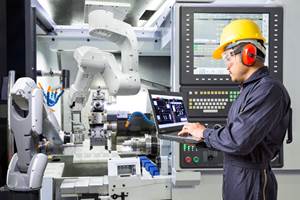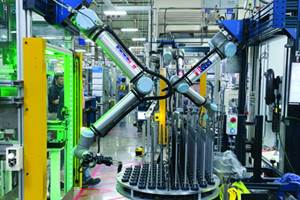Turn Your Home Into An Investment Profit Center
The key to successful tax planning is learning how to select the best tax-saving strategies to accomplish your specific goals. My job is easy: Pick the right strategies.
Share






.png;maxWidth=45)
DMG MORI - Cincinnati
Featured Content
View More

ECi Software Solutions, Inc.
Featured Content
View MoreThe key to successful tax planning is learning how to select the best tax-saving strategies to accomplish your specific goals. My job is easy: Pick the right strategies. Your job is tougher: Pick your goals. It’s a fact that goals change because of various events over a normal lifetime. Think about it. You get married, have kids and start a business. Then your kids get married, and some come into the business but some do not. Also, some get divorced. One day, your kids run (and ultimately own) the business. The list could go on forever.
Buying a home though, is one event that can be shared by nearly every successful person. Almost every reader of this column who calls me for tax advice says one of their goals is to pay off the mortgage on their home(s). Some have paid off their mortgages. A few even paid cash for their homes.
So, the question becomes, “Is it smart to pay off your home mortgage, or would it be smart to borrow as much as you can (via a mortgage or home equity loan) using your home as collateral?”
Let’s start to answer this with a few quotes from an article written by Steven Marshall and Mike Lowe titled, “How the Affluent Manage Home Equity.” They write that thousands of financially successful people who have more than enough money to pay off their mortgage refuse to do so.
The article goes on to say that these people go against many of the beliefs of traditional thinking by putting very little money down and keeping their mortgage balance as high as possible. Most importantly, they integrate their mortgage into their overall financial plan to continually increase their wealth. This is how the rich get richer. The authors continue, that while paying off the mortgage saves us interest, it denies us the opportunity to earn interest with that money.
The most thorough, simple and easy-to-understand explanation of keeping your mortgage high and investing the extra funds is detailed in Ric Edelman’s book, “The New Rules of Money.” Ric tells the story of two brothers who both earn the same amount and buy $200,000 homes. Brother A puts down $40,000 (all of his savings) and gets a 15-year mortgage at 6.38 percent. Also, Brother A pays an additional $100 each month to his lender to eliminate his mortgage sooner.
Now, Brother B puts down 5 percent ($10,000) on his $200,000 home and invests the $30,000 balance (of his $40,000 savings). He secures a 30-year, interest-only mortgage at 7.42 percent. As a result, his monthly mortgage payment is $428 less than Brother A. So, he invests $528 every month (the $428 plus the same extra $100 his brother is paying to his lender). Brother B’s investment account earns 8 percent.
Next, Ric does all the math, including tax savings. After 30 years, Brother A has $613,858 in savings and investments, and Brother B has $1,115,425.
Both brothers now own their homes mortgage free, but as Ric points out, Brother B can once again mortgage his home and “start fresh to enjoy the same benefits once again.”
Now, the real reason I was motivated to write this article was because of a series of articles in “The Ruff Times,” an investment newsletter written by Howard Ruff.
Ruff writes about why it is a good idea to borrow as much of your costly, non-producing equity in your home as you possibly can and put it to work in safe, income-producing investments. He says that because your mortgage-loan interest payments are tax-deductible, and because it is simple interest, you can put the money to work, even at a lower-stated rate, as long as it is a safe, secure place. This will be compound interest.
“For example, he says, in most cases you shouldn’t have an interest-only loan, but in this case maybe you should, because if you are merely paying interest, your monthly cash outlay will be lower, [while] the tax benefits will stay the same. The principle is ‘arbitrage.’ Just make sure you are earning more than you are paying out.
“So, borrowing against the property and putting it to work is a sound strategy. Spending the money on ‘things’ is a bad strategy. I am now borrowing against my northern Utah home, [and] I am now researching to see where I can get the biggest safe return as I put that mortgage money to work, producing income in excess of the cost of the mortgage.”
To summarize the simple arbitrage strategy explained by the above quotes, you should (1) borrow against your home; (2) invest the mortgage proceeds in a safe investment that earns more than the cost of the mortgage and (3) enjoy the tax benefits of a mortgage interest deduction.
Related Content
4 Rules for Running a Successful Machine Shop
Take time to optimize your shop’s structure to effectively meet demand while causing the least amount of stress in the shop.
Read More6 Machine Shop Essentials to Stay Competitive
If you want to streamline production and be competitive in the industry, you will need far more than a standard three-axis CNC mill or two-axis CNC lathe and a few measuring tools.
Read More4 Steps to a Cobot Culture: How Thyssenkrupp Bilstein Has Answered Staffing Shortages With Economical Automation
Safe, economical automation using collaborative robots can transform a manufacturing facility and overcome staffing shortfalls, but it takes additional investment and a systemized approach to automation in order to realize this change.
Read MoreHow to Mitigate Risk in Your Manufacturing Process or Design
Use a Failure Mode and Effect Analysis (FMEA) form as a proactive way to evaluate a manufacturing process or design.
Read MoreRead Next
Building Out a Foundation for Student Machinists
Autodesk and Haas have teamed up to produce an introductory course for students that covers the basics of CAD, CAM and CNC while providing them with a portfolio part.
Read More5 Rules of Thumb for Buying CNC Machine Tools
Use these tips to carefully plan your machine tool purchases and to avoid regretting your decision later.
Read MoreRegistration Now Open for the Precision Machining Technology Show (PMTS) 2025
The precision machining industry’s premier event returns to Cleveland, OH, April 1-3.
Read More
























.png;maxWidth=150)








.jpg;maxWidth=300;quality=90)









